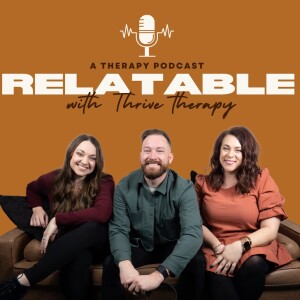
Monday Sep 23, 2024
EP 41: Trust
Is trust a gut feeling that you have, or actions that someone does, or something that you just give everyone when you meet them? The word trust is used a lot, but it is not well defined. On this week’s episode of Relatable, we explore how we approach trust in relationships, particularly whether we start by trusting people until they prove untrustworthy, or if we wait for them to earn our trust. It emphasizes that trust isn't one-size-fits-all, as it depends on what we're trusting someone with.
Key Discussion Points:
What trust looks like to one person, may not be the same as others. Some people will give trust to others right away and start retracting as they start to see they are untrustworthy and others are the opposite–not giving trust until they see they are capable of it. How do we decide what aspects of someone (e.g., their intentions or their actions) we trust early on?
Defining Trust: For those who haven't experienced secure relationships, there can be a tendency to either shut people out (rigid protection) or trust everyone (boundarylessness). Without the ability to discern between green, yellow, and red flags in relationships, it becomes difficult not only to trust others but also to trust oneself. Brene Brown’s idea of "BRAVING," seven key indicators of trust: Boundaries, Reliability, Accountability, Vault (confidentiality), Integrity, Non-judgment, and Generosity helps us break down what defines trust in relationships. Which of the 7 areas causes you to lack trust with other individuals?
In this episode, Cayla tells those that are building and discerning trust to visualize these 7 categories as buckets that overtime we are filling which will aid us in knowing if we can trust someone. The metaphor of trust as "buckets" suggests that trust builds gradually, and when one of the buckets is low, it's an opportunity for communication, not an automatic end to the relationship. It encourages us to reflect on whether that person is trustworthy and where both parties might be able to improve when fostering trust. In your own life, when you see that others are dropping the buckets, are you quick to end the relationships or are you one to address these concerns with the other party?
The message of this episode is that trust (how it's formed, maintained, and sometimes broken) can be determined by many different factors. At the core is the idea that trust is not an all-or-nothing concept but a nuanced, gradual process that involves discernment, boundaries, and a set of clear indicators. Ultimately, trust is presented as both a personal and relational practice that requires ongoing effort. By being mindful of the BRAVING framework, we can better navigate trust in all areas of life—ensuring that we not only trust others but also show up as trustworthy ourselves.
No comments yet. Be the first to say something!